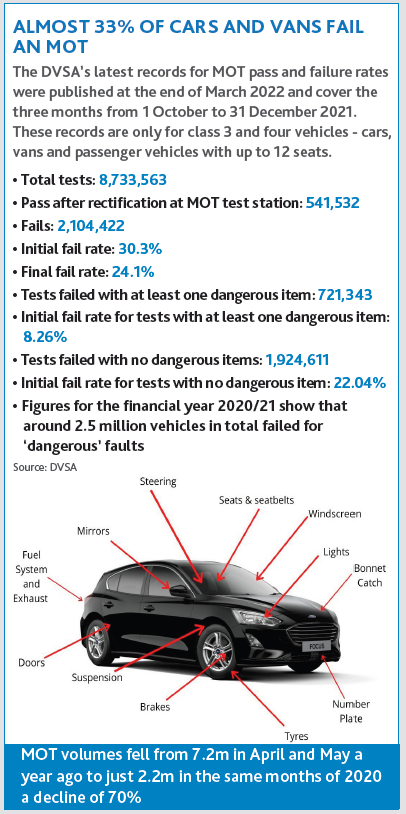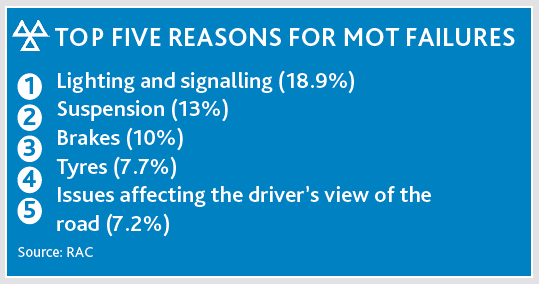NEW TWO YEAR MOT PROPOSALS WIDELY COMDEMNED BY AUTOMOTIVE INDUSTRY

The Government’s proposals to lengthen the MOT interval to every two years have been met with fierce criticism from automotive organisations, brands and key figure heads. A huge petition has been launched against the idea. Here we take a look at the issues that will affect many garages and car drivers alike:
The proposal considers stretching the interval period for the £55 vehicle check-up, which is designed to ensure a car meets the minimum safety standard to be on the road, to every 24 months. Under current rules, an MOT needs to be carried out annually on all cars over three years old.
The maximum cost of an MOT for a car is set at £54.85, though the cost of rectifying issues found with almost a third of vehicles means the overall bill is usually much higher for many motorists.
Experts have pointed to the latest MOT records held by the Driver and Vehicle Standards Agency (DVSA), which show that 30.3% of cars and vans fail the test at the first attempt, with almost one in ten having at least one ‘dangerous’ fault.
The RAC said a decision to extend MOTs to two years would make our roads ‘far less safe’ and the Independent Garage Association called the plan ‘dangerous, unwanted and unreasonable’.
Transport Secretary Grant Shapps is believed to have raised the idea of allowing vehicles to be checked less often, potentially saving drivers hundreds of pounds. Asked about the issue by the Commons’ Transport Select Committee he said any changes would need to meet a ‘very rigorous safety standard’. He went on: ‘If you look at things like MOTs – cars have clearly become a lot more reliable than when the MOT, named after the Ministry of Transport, was put in place.
‘I think it’s always right to keep these things under review, but there’s a lot of road to cover before we get to that point.’
Transport Select Committee member, Karl McCartney, told Mr Shapps it was ‘an absolutely crass idea’.
The suggestions come just weeks after the Motor Ombudsman raised concerns about the cost-of-living crisis leading to many drivers skipping having their cars serviced, which is not a legal requirement but is a recommended measure on top of the annual MOT to ensure a vehicle is operating safely. It said earlier this month that delaying or cancelling a service could devalue motors as well as increase safety risks.
Almost one in three drivers it polled said they intend to spend less on motoring this year due to squeezed budgets.
Almost a quarter of drivers without a pre-paid servicing plan for their car said they will delay their motor’s annual service this year, while a third said they will miss it entirely in a bid to reduce their outgoings, the survey of 2,000 motorists revealed.
Those plans were abandoned by the Conservative–Liberal Democrat Coalition Government a year later over road safety concerns after it was revealed that as many as 4.3million unroadworthy cars might have been on Britain’s streets due to incorrect assessments at MOT testing centres at the time.
Since then, the MOT has become a much stricter test of a vehicle’s condition, especially when new rules were introduced in 2018.
These included more stringent checks of emissions from diesel cars, with any sign of smoke of any colour from the exhaust resulting in an automatic failure.
May 2018 also saw the implementation of new defect categories – minor, major and dangerous – to help motorists better understand what was wrong with their vehicles.
All ‘major’ and ‘dangerous’ issues result in an automatic test failure, while the latter recommends that the defect in question should be repaired before the car can be driven again.

RAC head of roads policy Nicholas Lyes said: ‘The purpose of an MOT is to ensure vehicles meet a basic level of safety for driving on our roads.
‘Shifting it from annually to every two years would see a dramatic increase in the number of unroadworthy vehicles and could make our roads far less safe.’
In a string on tweets posted in response to the talk of extending the test, Lyes added ‘this is not a wise move’ and said the proposal should be ‘consigned to the bin’.
Lyes’s counterpart at the AA, Jack Cousens, said such a move would not only make more cars unsafe but also have a huge impact on the motor repairs sector.
‘Though well intended, moving the yearly £55 spend on an MOT to every two years could make costs worse for drivers with higher repair bills, make our roads more dangerous and would put jobs in the garage industry at risk,’ Cousens explained.
‘Only recently the government stepped away from switching the MOT to every two years on the grounds of road safety, while AA polling shows overwhelming support from drivers who like the security that an annual health check provides. ‘The MOT now highlights major and dangerous defects too, showing how important it is to keep cars in a safe condition.’
He said the Prime Minister should instead look into saving Britain’s money at the fuel pumps and expanding Park & Ride schemes so drivers can avoid higher inner-city driving costs.
Mike Hawes, Chief Executive of the Society of Motor Manufacturers and Traders said “The industry shares the widespread concern over rising prices and the squeeze on household incomes. Safety, however, must always come first and whilst today’s vehicles are more reliable than ever, regular MOTs ensure critical components such as brakes and tyres which wear out as a function of normal operation, are properly inspected and maintained. Stretching MOT intervals will undermine the safety net at a time when vehicle miles driven are increasing. To ensure the safety of our roads, drivers, passengers, pedestrians and other road users, inspections and maintenance must be carried out annually following their first presentation in year three”.

The National Franchised Dealers Association also condemned the plans, declaring them ‘ill-thought-out and unsafe’. Sue Robinson, chief executive called on Mr Johnson and Mr Shapps to ‘reconsider’ the ‘deeply concerning’ proposals that she said had been raised ‘without prior consultation with the industry’.
Stuart James, boss at the Independent Garage Association, was incredibly critical of the idea: ‘In our opinion this whole plan is dangerous, unwanted and unreasonable,’ he said.
‘This proposal has been scrutinised at least four times that I have known of in the last 15 years, and every time it has been deemed detrimental to road safety.
‘It is a fact that in times of economic hardship, motorists cut back on servicing their cars and it is the annual MOT that has kept the UK’s road safety at high levels thanks to the vital safety checks it carries out. Saving the cost of an MOT biannually is not worth the price of national road safety.
‘This proposal will also fail to save motorists any money long-term as defects will go unnoticed for longer, which at best will cause more damage to vehicles and increase repair costs, and at worst cause unnecessary breakdowns and accidents.’
He added that the IGA will be writing to the Transport Minister to make its position clear and explain how none of the dangers and risks have changed since previous proposals to reduce the frequency of the MOT test.
Experts previously warned of the dangers of extending MOTs in lockdown
MOTs were extended temporarily at the beginning of the pandemic. A six-month MOT test exemption was introduced on 30 March 2020 to help slow the spread of Covid-19 as the country was sent into its first full lockdown. However, the Government at the time warned motorists that they would be responsible for ensuring their cars were roadworthy – else face a fine of up to £1,500.
Records for April and May that year showed that MOT test volumes fell to just 2.2million, down from 7.2million over the same two months in 2019.
When Boris Johnson lifted restrictions on car use in England in May, experts raised concerns that many vehicles could be unsafe and called for the exemption to be scrapped with immediate effect.
The SMMT and Institute of the Motor Industry warned that many of the cars being used at the time would not have been in a safe condition, given that many had barely been used for two months and some were overdue their annual MOT.
The IGA said the six-month exemption put ‘motorists at a greater risk of prosecution through no fault of their own’, especially as many drivers lack the knowledge required to maintain their own cars.
Chief executive. Stuart James also added that motorists could face much bigger bills once they do have their cars MOT tested, due to the deterioration of parts over the period without having a mechanic check the roadworthy condition of vehicles.
He told This is Money in May 2020: ‘One in three vehicles fails its MOT test, and with the number of cars on the road sharply on the rise as lockdown restrictions begin to ease, the question of road safety needs to be addressed.
‘Delaying the MOT increases repair costs, and leaves motorists vulnerable for prosecution for worn out components that are not replaced when they need to be.’
The extension was subsequently ended early and abolished after 31 July 2020.
FIND THE RIGHT OIL FOR YOUR VEHICLE TO HELP AVOID WEAR & TEAR AND UNECESSARY BREAKDOWNS
Visit: withamgroup.co.uk/lubricant-finder




Leave a Reply